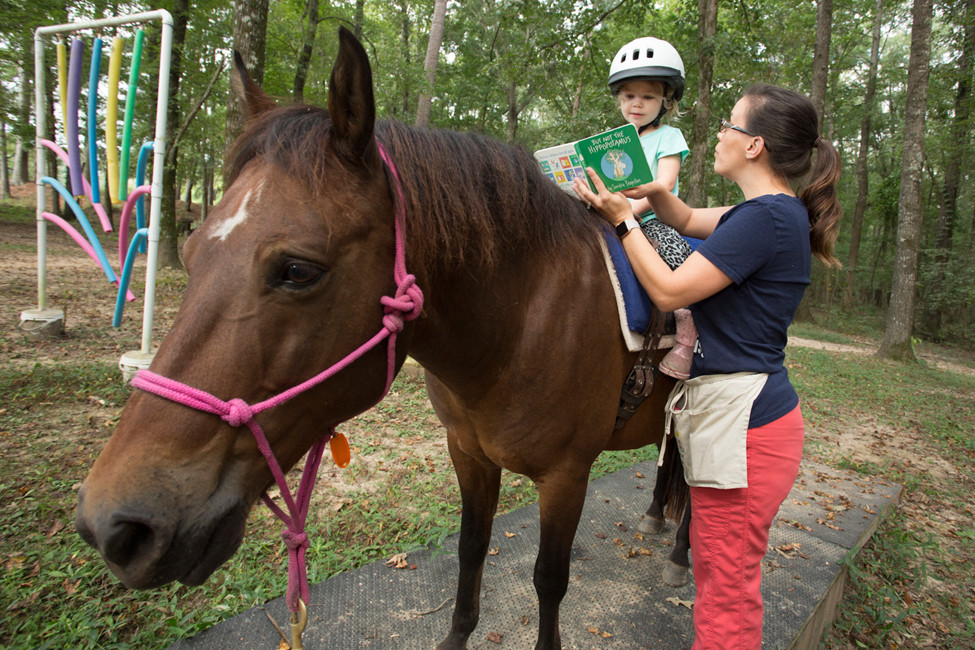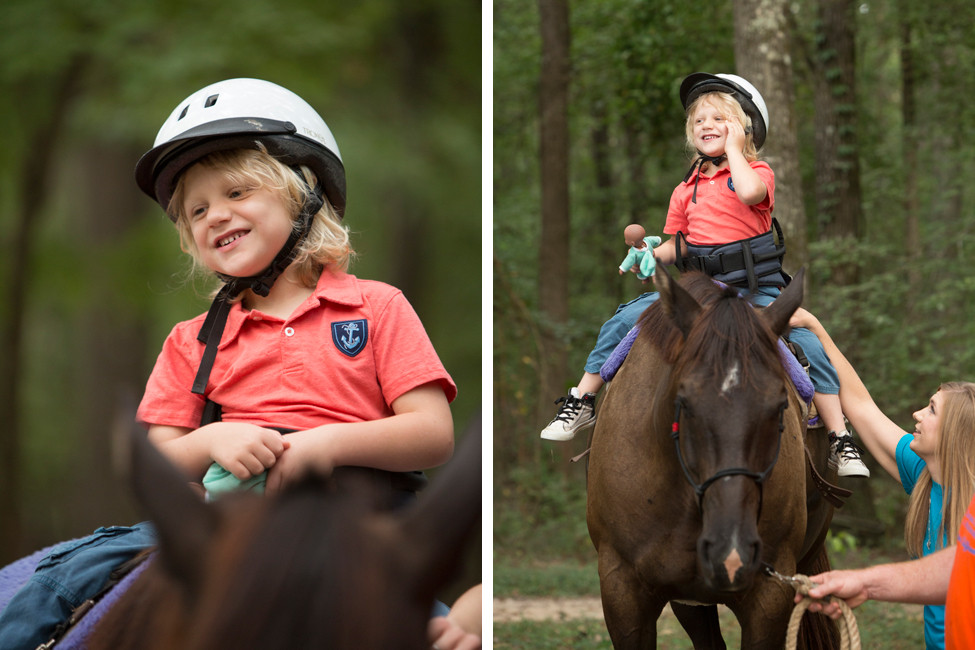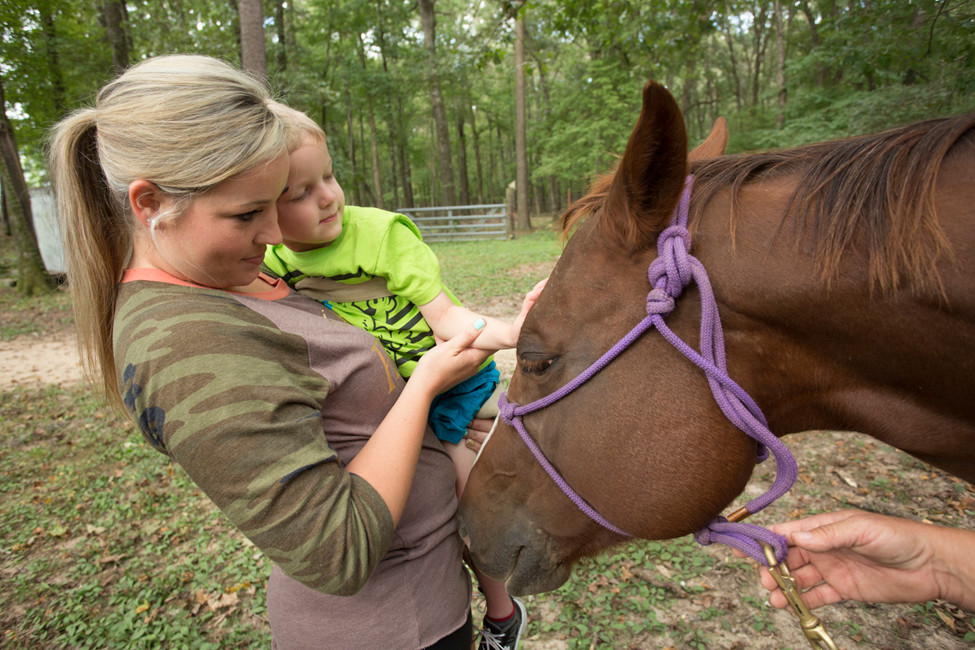‘Saddle Therapy' Increasing Benefits of Speech, Occupational and Physical Therapy

Horses can be miracle workers in the world of therapy. And speech therapist Sarah Allen has seen quite a few of those miracles in her eight years of practicing hippotherapy.
“There was a little girl with childhood apraxia (of speech) and she was two and a half and she started riding. We put her on Lucky and the whole time she was on Lucky she was imitating sounds and just having this incredible session,” Allen said. “And we got her off the horse and she ran up going ‘Mommy! Mommy! Mommy!’ just screaming, and her mom just froze and started crying. It was the first time she had ever said ‘Mom.’ So she got off the horse and we’re all crying.”
Allen said that the student continued to ride and go through hippotherapy for the next two years and made “the most unbelievable progress.”
Hippotherapy uses horseback riding as a therapeutic or rehabilitative treatment, and it has a reach far beyond speech therapy. It is utilized for physical and occupational therapy as well and can help riders with disabilities ranging from cerebral palsy to autism to speech disorders. The idea and techniques behind the therapy are similar or the same as at a clinic, but the horse is used as a modality to accomplish the goals and objectives for the student.
According to Allen, hippotherapy allows the therapist to adjust the movement and input from the horse in order to accomplish specific therapeutic outcomes for the rider.
“What the horse does is it gives that rhythmical input through the neurological system,” Allen said. “So for speech, it’s super important because it promotes that neurological organization in the child, and then that can lead to us making pretty cool gains.”
The role of the horse seems more obvious when hippotherapy is used for physical therapy. The horse’s gait can help improve core or leg strength and muscle relaxation of its riders.
“A young man Meredith sees took his very first step out here unaided. It’s kind of cool,” Allen said.

Stable Relationship
Meredith Rook is another therapist at Freedom Reins in Benton (the program is run by Kidsource Therapy and hosted at Harmony In Hooves stables), and has been involved with hippotherapy for about five years. She said the program is not geared toward a particular age and some of the students have been as old as 21.
However, she emphasized that even though it does wonders for some kids, it doesn’t always work.
“It might not be for everybody, so if it’s not working as a modality we are very upfront about it — that we aren’t seeing any change or any difference from it, so let’s try something new and go somewhere else,” Rook said. “It’s not always a 100 percent fix. It’s just another way to try.”
Rook’s student Jackson Mohr is 5 years old with a speech delay and concerns of autism. He has been riding at Freedom Reins for about two years. According to his dad, Michael, and stepmom, Jessie, Jackson was nervous at first but now looks forward to therapy, and they can see obvious progress.
“I’ve noticed he’s more vocal when we leave therapy … He’s definitely retaining what he’s learning here,” Jessie Mohr said. “If the focus is on the animal, it can help the therapist get through to the child — it’s not like sitting in a room just talking. The kid doesn’t feel cornered.”
Wyatt McMullen, 5, has Pelizaeus-Merzbacher disease, a rare condition that affects intellectual functions, such as language and memory, and delays motor skills such as coordination and walking. Although he uses hippotherapy for speech therapy with Allen, his mother, Whitney McMullen, says that she has also seen physical improvements from riding the horses.
“About two weeks after we started, his physical therapist and occupational therapist both came to me asking me if I had noticed him getting strong, and I was like ‘oh my gosh, it’s these horses,’” said Whitney McMullen. “We haven’t done anything different, it’s the same therapy he’s been having for years. It’s these horses. The strength that they give these kids is amazing.”
She said that when Wyatt first gets on the horse his muscles are so tight that he can’t straddle the horse correctly, but after only two laps, his muscles will relax enough to sit properly. Allen rides sitting behind Wyatt because he does not have enough core strength to sit or hold his head up. But Whitney said she sees his strength improving and he also attempts to be more verbal.
She was hesitant to enroll Wyatt in the hippotherapy at first, but after seeing the improvements so quickly, she plans to keep him in the program.

Spur of the Moment
Hippotherapy can go beyond working toward certain objectives or goals. It can also perform something as simple — and yet so powerful — as bringing happiness back into a rider’s life.
Allen said one of her riders tried hippotherapy for the first time at 18. The student was autistic and almost completely non-verbal. By his third session, he was using spontaneous sentences. However, to his mother that wasn’t even the best thing about hippotherapy.
Allen says she saw one of the biggest moments of her hippotherapy career after the student’s first session. “He got off the horse, and his mom had a little tear coming down,” said Allen.
After Allen offered praise to the emotional mother that the student had successfully gone so far as to touch the horse, she said the mother replied, “Touched the horse? We haven’t seen him smile in over two years. He just laughed for 45 minutes.”
In order to enroll a child at Freedom Reins, parents must either bring in their child for an evaluation at Kidsource or have a therapist at their current clinic or facility write a letter explaining why they believe the child would be a good candidate for hippotherapy. Riders typically come once a week, and therapy is covered by insurance, Medicaid or private pay. The barn fee is $35 per session, with some scholarships available.
The results can be astonishing.
“I’ve seen kids say their first words. I’ve seen kids walk when they haven’t been able to before they got on the horse. I’ve seen kids be able to learn from that sensory input to put simple syllables together, when all they could get out of their mouths before they started riding was ‘uh, uh, uh,’ and that’s just after one or two sessions,” Rook said.
“It’s pretty amazing. That massive input from the muscle movements of the horse just adds such an organization and change in the neural pathways sometimes that it just has benefits beyond belief.”
Info:
- To learn more about hippotherapy through Kidsource, visit KidsourceTherapy.com.
- Contact Meredith Rook at (501) 315-4414 or MRook@KidsourceTherapy.com.
- The Harmony In Hooves facility is located at 1300 Jimmy Lane in Benton.
